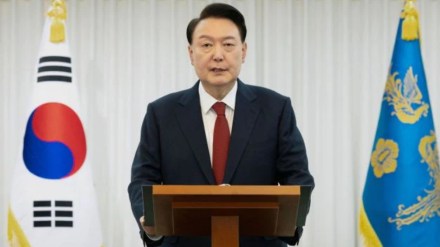South Korea’s democratic resilience faced a dramatic challenge with the downfall of President Yoon Suk-yeol. Arrested on January 15, 2025, following his impeachment, Yoon’s presidency ended in chaos, marked by a desperate declaration of martial law that evoked the authoritarian shadows of the country’s past. His brief but polarising tenure serves as a stark reminder of democracy’s fragility and the enduring strength of South Korea’s institutions.
The Rise and Fall of Yoon Suk-yeol
Elected in May 2022, Yoon Suk-yeol promised reform and accountability but quickly became a polarising figure. His administration faced allegations of corruption, economic mismanagement, and political overreach. By late 2024, public dissatisfaction had reached a boiling point, with protests erupting across the nation.
On December 3, 2024, Yoon declared martial law, claiming it was necessary to counter “anti-state activities” and restore order. The measure, which included suspending legislative sessions and restricting press freedoms, drew immediate backlash. Within hours, South Korea’s National Assembly voted to rescind the declaration, and thousands of citizens took to the streets in defiance, braving harsh winter conditions to demand its reversal.
Facing overwhelming opposition, Yoon lifted martial law just six hours later. However, the damage to his presidency was irreversible. On December 14, lawmakers voted overwhelmingly to impeach him, accusing him of abuse of power. This set the stage for his eventual arrest, a historic moment as South Korea’s first sitting president to face such a fate.
A Nation’s Painful History Revisited
South Korea’s response to Yoon’s actions was shaped by its traumatic history with authoritarianism. From Japanese colonial rule to the military dictatorships of Park Chung Hee and Chun Doo-hwan, the nation has endured decades of repression. Chun’s imposition of martial law in 1980, which led to the Gwangju Uprising and the deaths of hundreds of pro-democracy protesters, remains a vivid reminder of the dangers of unchecked power.
The memory of these dark chapters explains the swift rejection of Yoon’s martial law order. South Koreans, who have fought hard to transition to democracy since 1987, were quick to mobilise against what they saw as a dangerous regression.
The Martial Law Declaration and Fallout
Yoon’s martial law decree accused opposition lawmakers of collaborating with North Korea and stoking unrest. The order suspended political activities, limited press freedoms, and authorized the military to intervene in civil matters. Yet, instead of consolidating control, the move united opposition parties, civil society, and ordinary citizens against him.
The military, once a tool of oppression during past authoritarian regimes, refused to support Yoon’s actions, a testament to decades of reform and the public’s insistence on civilian oversight. The National Assembly’s swift vote to overturn the decree, combined with mass protests, showcased the robustness of South Korea’s democratic framework.
Parallels to Trumpian Populism
Yoon’s actions have drawn comparisons to other populist leaders, particularly former U.S. President Donald Trump. Both leaders relied on divisive rhetoric, framed opposition as existential threats, and undermined democratic norms in moments of crisis. Yoon’s martial law gambit mirrors Trump’s refusal to concede the 2020 U.S. election, culminating in the Capitol riot.
In both cases, institutions held firm. South Korea’s parliament, judiciary, and military resisted Yoon’s overreach, just as American courts and lawmakers upheld the rule of law during Trump’s challenges to the electoral process. These parallels highlight the importance of institutional resilience in countering authoritarian impulses.
Yoon’s Arrest and Its Implications
Yoon’s arrest on charges of abuse of power and insurrection marks a turning point in South Korea’s political landscape. His fall highlights the limits of populist authoritarianism in a society deeply committed to democracy. Public reaction remains polarised, with his supporters echoing Trump-era slogans like “Make Korea Great Again” and alleging political persecution, despite the evidence against him.
Meanwhile, the broader public views his downfall as a reaffirmation of democratic values. The episode has sparked renewed debates about press freedom, judicial independence, and the need for vigilance against authoritarian backsliding.
Lessons for South Korea and Beyond
The Yoon saga is both a cautionary tale and a triumph of democracy. It highlights the fragility of democratic norms, even in mature systems, and the need for constant vigilance. South Korea’s swift response—from lawmakers to ordinary citizens—demonstrates the power of collective action and robust institutions.
As the nation moves forward, Yoon’s presidency will be remembered not just as a scandal but as a reminder of the sacrifices and struggles that underpin South Korea’s democratic journey. For global observers, it offers valuable lessons on resisting authoritarian tendencies and safeguarding democratic governance.
South Korea has once again shown that democracy, while vulnerable, is far from fragile when its defenders stand united.
